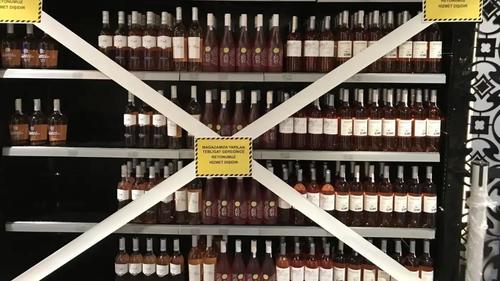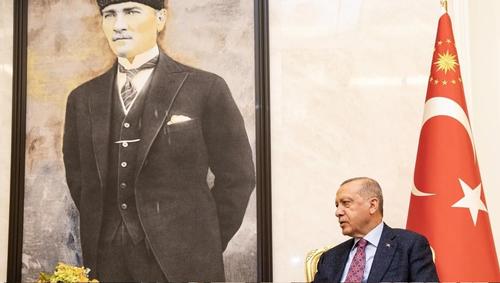Turkey Cracks Down On Alcohol As Erdogan Pushes Islamist Agenda
Turkey, which Ataturk’s reforms dragged kicking and screaming from the confines of medieval Islam into the modern world, is fast regressing to its original state under its despotic ruler Recep Tayyip Erdogan who is seeking to place Islam at the heart of national politics to deflect away from his catastrophic rule, and steer the overwhelmingly Muslim country toward the Middle East and away from the West. He is doing so by restricting the use of alcohol, to start.
On April 29, the Turkish government imposed a nearly three-week nationwide lockdown and ban on alcohol sales through the end of Ramadan. Even at grocery stores allowed to operate during the period, liquor sections were sealed off with tape notifying customers that the corner has been temporarily closed by government order.

As the Nikkei details, many people rushed to buy liquor before the lockdown. An employee at a midsize winery in the western region of Thrace said it had received telephone inquiries about delivery from about 30 customers. “I guess we have never sold so much alcohol during Ramadan,” she said.
The lockdown ended May 17, but the government would keep the weekend curfews and alcohol ban through the end of the month. It may extend it beyond. Many Turks question the effectiveness of the ban on drinking at home as an antivirus measure and criticize the move as undue meddling in private lives.
Since taking power in 2002, the Islamist ruling Justice and Development Party has clamped down on alcohol. The government has increased related taxes over the years and in 2013 passed a law banning alcohol ads and sales at liquor stores after 10 p.m. It also prohibits makers and sellers of alcohol from sponsoring sports events.
And these are only the visible measures. Although more than 150,000 stores, including supermarkets, sell alcohol in Turkey, over the past few years it has become increasingly difficult to obtain permission to open new stores to sell liquor, said Ozgur Aybas, head of a liquor store association that opposes government restrictions. In some conservative regions, local authorities turn down stores’ applications, saying alcohol is a sin.
Erdogan is a pious Muslim known for his dislike of alcohol. “The president may be trying to turn Turkey into a place like Dubai, United Arab Emirates, which allows alcohol consumption only among non-Muslim foreigners,” said Aybas, echoing similar views in the industry.
Although Turkey is a Muslim-majority country, it has a rich drinking culture and produces a wide variety of alcoholic beverages, including beer, wine and raki, the country’s signature spirit. Drinking became legal soon after the Republic of Turkey was established in 1923. Mustafa Kemal Ataturk, the founder of modern Turkey and a hard drinker, helped establish a state-owned winery.
Ataturk – who regarded Islamic politics and society as the primary obstacle – pushed for Westernization with a focus on the separation of state and religion. While some see Turkey as a Middle Eastern country, international organizations and Western media often regard it as part of Europe. Turkey is a member of NATO and was named as a candidate for EU accession in 1999.
Erdogan has been trying to reverse the country’s secularization. Last year, the government converted Istanbul’s Hagia Sophia, a World Heritage site secularized by Ataturk in 1934, into a mosque, and this past March it announced a withdrawal from the Istanbul Convention, an international accord designed to protect women from violence.
Diplomatically, Turkey has actively engaged in the Palestinian issue as a Muslim country, and its EU accession has been practically put on hold.
The current move to tighten alcohol regulations is part of Erdogan’s effort to promote Islam and traditional values. When the tougher law was introduced in 2013, Erdogan implicitly criticized Ataturk and his longtime ally Ismet Inonu by saying, “Given that a law made by the two drunkards is respected, why should a law that is commanded by religion be rejected by your side?”

Erdogan is trying to appeal to the country’s conservatives, who make up a majority of the population but often feel neglected by secular elites, who did not even allow women to wear headscarves in public at times.
According to several private-sector surveys, only around 20% of Turks drink alcohol regularly, while the state-run Turkish Statistical Institute – which is more Erdogan’s personal propaganda arm than anything data-driven – reported that more than 70% of those age 15 or older have never had alcohol.
Yet people seem weary of the government’s move to limit their freedom to choose their favorite drink. In a recent survey conducted by Istanbul Economics Research, 56% of respondents saw the recent alcohol ban as inappropriate, while 44% voiced their support. The poll shows that many in the nondrinking segment have reservations about the ban.
Soner Cagaptay, director of the Turkish Research Program at the Washington Institute for Near East Policy, said that Erdogan and Ataturk are very similar in that both try to transform the country based on their own vision — but their visions are completely opposite.
Tyler Durden
Tue, 06/01/2021 – 02:45
via ZeroHedge News https://ift.tt/3geNQAH Tyler Durden